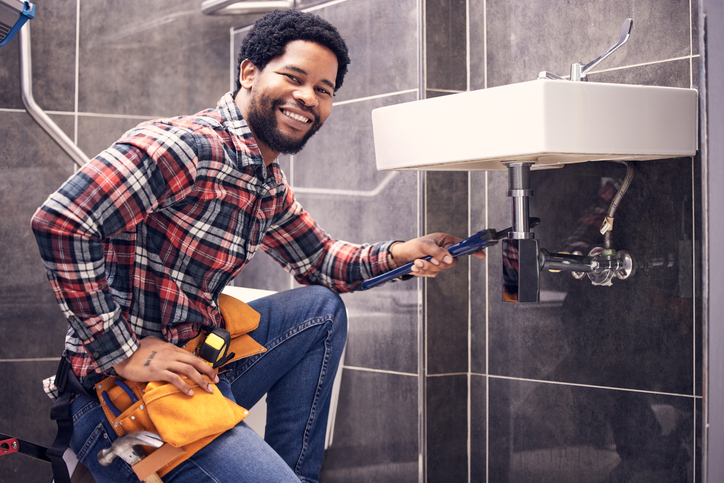Water conservation is a growing concern for businesses as utility costs rise and environmental sustainability becomes a priority. Commercial plumbing installation significantly impacts water usage and efficiency, influencing a company’s overall resource management. Properly designed and maintained plumbing systems reduce waste, lower operational costs, and contribute to environmental responsibility. This article explores how a commercial plumbing setup affects water conservation and highlights key strategies to improve efficiency.
1. Efficient Fixtures and Appliances Reduce Water Waste
One of the most effective ways business plumbing installation promotes water conservation is through the use of efficient fixtures and appliances. Modern plumbing systems incorporate low-flow faucets, water-saving toilets, and sensor-based fixtures that minimize unnecessary water usage.
- Low-flow fixtures: These devices use significantly less water than traditional models while maintaining performance. For example, a low-flow toilet uses 1.28 gallons per flush compared to older models that use up to 3.5 gallons.
- Sensor-based faucets and urinals: These fixtures automatically turn off when not in use, preventing water waste caused by human error.
- Energy-efficient dishwashers and washing machines: Installing commercial-grade water-efficient appliances ensures that businesses save thousands of gallons of water annually.
2. Leak Prevention and Detection Save Resources
Leaks are a major source of water waste in commercial buildings. Even a small leak can lead to thousands of gallons of lost water over time, increasing utility costs and environmental impact. Proper corporate plumbing services incorporate leak prevention and early detection strategies.
- High-quality piping materials: Using durable, corrosion-resistant pipes prevents leaks and extends the lifespan of the plumbing system.
- Advanced leak detection systems: Smart water meters and automated monitoring systems detect leaks early, preventing extensive water waste.
- Routine maintenance and inspections: Scheduled plumbing maintenance identifies potential issues before they become major problems, ensuring efficient water use.
3. Greywater Recycling and Reuse to Optimize Water Efficiency
Greywater systems play a crucial role in water conservation by recycling water from sinks, showers, and appliances for reuse in non-potable applications. A proper commercial plumbing setup includes the integration of greywater systems to maximize water efficiency.
- Irrigation systems: Reusing greywater for landscaping and irrigation significantly reduces freshwater demand.
- Toilet flushing: Greywater can be treated and reused for flushing toilets, saving thousands of gallons of potable water.
- Industrial processes: Many commercial facilities use greywater in cooling towers and other industrial applications to cut down on water consumption.
4. Smart Water Management Systems Improve Conservation
Technology has revolutionized water conservation in commercial plumbing setups. Smart water management systems provide real-time monitoring and automation to optimize water usage.
- Automated water usage tracking: These systems monitor consumption patterns and detect inefficiencies, allowing businesses to adjust usage accordingly.
- Remote control and alerts: Business owners and facility managers can track water use remotely and receive alerts in case of irregularities, reducing waste.
- AI-driven predictive maintenance: Artificial intelligence can identify potential plumbing issues before they lead to excessive water loss, ensuring proactive maintenance.
5. Proper Pipe Sizing and System Design Enhance Efficiency
Enterprise plumbing solutions must include proper pipe sizing and system design to ensure optimal water pressure and minimal waste. Poorly designed plumbing systems can lead to excessive pressure, leaks, and inefficient water distribution.
- Correct pipe diameter: Pipes that are too large or too small for a building’s needs can cause pressure imbalances, leading to leaks and inefficient water use.
- Optimized routing: Designing plumbing systems with the shortest, most efficient routes minimizes water loss and energy consumption.
- Zoning and demand-based supply: Installing separate zones for high- and low-demand areas ensures that water is distributed efficiently.
6. Rainwater Harvesting Supports Sustainable Water Use
Rainwater harvesting systems collect and store rainwater for various uses, reducing reliance on municipal water supplies. Many plumbing infrastructures for businesses now incorporate rainwater harvesting to support sustainability efforts.
- Storage tanks and filtration: Collected rainwater can be filtered and stored for future use in irrigation, cooling systems, and restrooms.
- Cost savings: Businesses can significantly lower water bills by supplementing their supply with rainwater.
- Environmental benefits: Reducing demand for municipal water sources helps preserve natural resources and lessen the impact on local water supplies.
7. Compliance with Water Conservation Regulations and Certifications
Commercial plumbing systems must adhere to water conservation regulations to ensure compliance and sustainability. Meeting these standards not only conserves water but also enhances a business’s reputation and operational efficiency.
- LEED certification: Leadership in Energy and Environmental Design (LEED) encourages businesses to adopt sustainable plumbing solutions.
- EPA WaterSense program: Installing WaterSense-certified fixtures ensures compliance with water conservation standards.
- Local and state regulations: Many municipalities enforce strict water usage policies, requiring commercial properties to implement conservation measures.
8. Employee and Customer Awareness Promote Conservation Efforts
While efficient plumbing systems contribute to water conservation, human behavior also plays a significant role. Businesses can implement awareness programs to encourage employees and customers to use water responsibly.
- Signage and reminders: Posting conservation tips in restrooms and kitchen areas helps reduce unnecessary water use.
- Incentive programs: Rewarding employees for water-saving initiatives encourages long-term conservation efforts.
- Educational workshops: Providing training on water conservation strategies ensures that all employees participate in sustainability efforts.
Commercial plumbing installation significantly affects water conservation by incorporating efficient fixtures, leak prevention, greywater recycling, and smart water management systems. Properly designed and maintained plumbing systems reduce water waste, lower operational costs, and contribute to environmental sustainability. By implementing these strategies, businesses can improve their resource management while complying with water conservation regulations.
Optimize water usage with expert commercial plumbing installation! Classic Heating & Air provides efficient solutions to reduce waste and lower costs. Contact us today for sustainable plumbing services tailored to your business needs!
 Schedule a Service
Schedule a Service

 Call Us 214-851-2824
Call Us 214-851-2824

